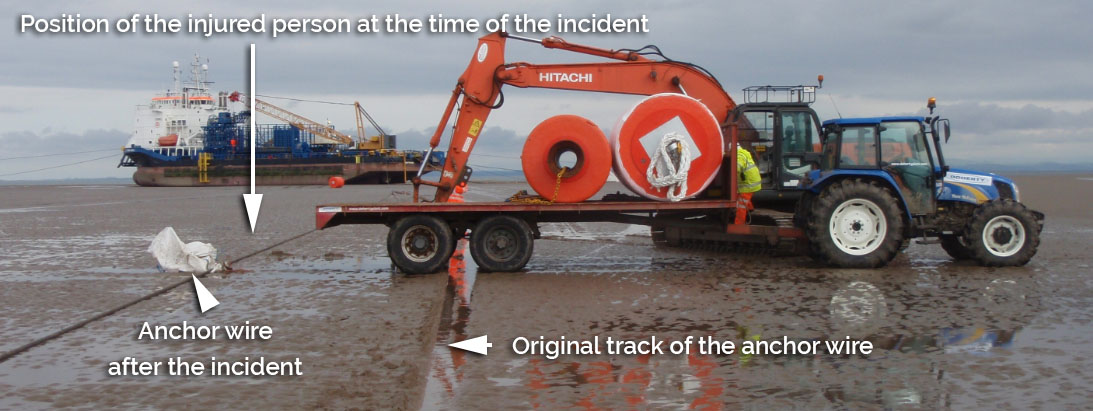Injury caused by movement of wire rope under tension
A member has reported an incident in which someone was injured by an anchor wire that skidded off unexpectedly off a flatbed trailer. The incident occurred on a beach during cable installation operations, when personnel were connecting midline buoys to an anchor wire. The injured person sustained a broken foot but the incident had the potential to be a fatality.

Our member’s investigation revealed one of the root causes was lack of knowledge of what was happening at the worksite: persons involved were not aware of the fact that tension is still in a wire even when hanging slack and lying on the beach for a considerable length (700 meters).
The lesson learnt is that it is in the nature of a wire rope that there will always be stored or residual energy in a length of it. This introduces a range of potential safety issues including manual handling and unexpected release of energy when handling the wire ropes. These issues should be taken into account in job planning, tool box talk and risk assessment before the start of the job.
Members may wish to refer to the following similar incidents (key words: wire rope, tension, stored energy):
Safety Event
Published: 13 May 2014
Download: IMCA SF 07/14
IMCA Safety Flashes
Submit a Report
IMCA Safety Flashes summarise key safety matters and incidents, allowing lessons to be more easily learnt for the benefit of all. The effectiveness of the IMCA Safety Flash system depends on Members sharing information and so avoiding repeat incidents. Please consider adding safetyreports@imca-int.com to your internal distribution list for safety alerts or manually submitting information on incidents you consider may be relevant. All information is anonymised or sanitised, as appropriate.
IMCA’s store terms and conditions (https://www.imca-int.com/legal-notices/terms/) apply to all downloads from IMCA’s website, including this document.
IMCA makes every effort to ensure the accuracy and reliability of the data contained in the documents it publishes, but IMCA shall not be liable for any guidance and/or recommendation and/or statement herein contained. The information contained in this document does not fulfil or replace any individual’s or Member's legal, regulatory or other duties or obligations in respect of their operations. Individuals and Members remain solely responsible for the safe, lawful and proper conduct of their operations.
